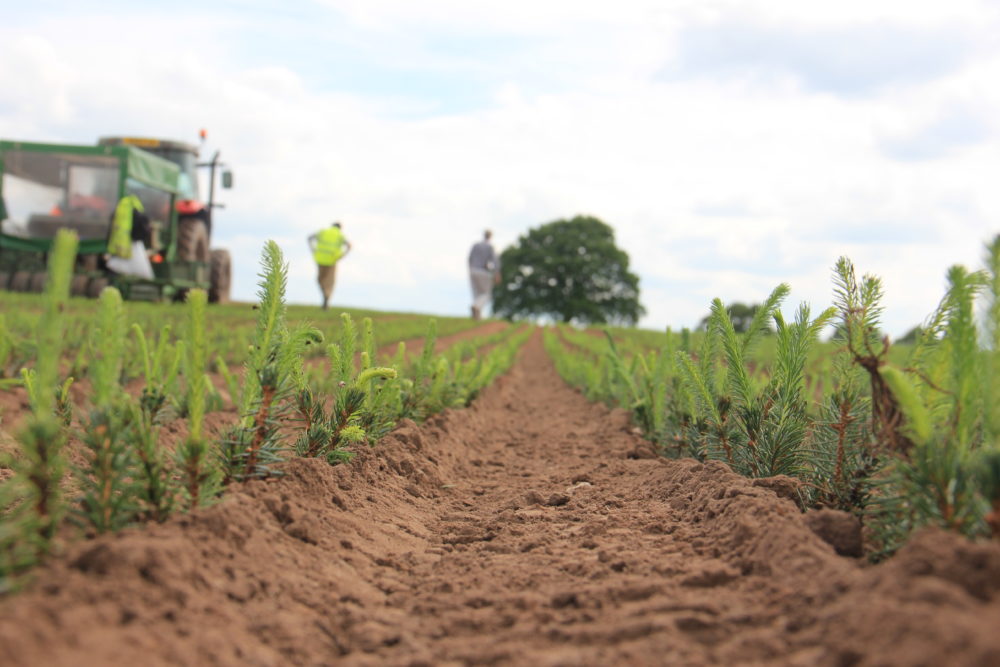Quality Throughout
Plant Quality improvement- Working with Maelor Nurseries
Tim Liddon, Forestry Director explains why Tilhill forestry are endeavouring to work with suppliers and subcontractors in partnership to build business and deliver great services to our clients. One example of where partnership and collaborative working has delivered significant gains to our clients, to the supplier, and to Tilhill can be seen through our relationship with Maelor Forest Nurseries.
We have known and worked with Maelor for over 30 years, but it is in the last 15 years or so when the close partnership we enjoy today developed. The closer relationship started when Tilhill and Maelor set up a rolling three year contract. This gave Maelor a guarantee of sales and Tilhill a guarantee of supply, which was critical in the early 2000’s when demand was uncertain. This enabled maelor to invest and start to deliver the improvements that we needed to see.
The first area of work was to improve the morphology of the sitka seed orchard material so that it established more quickly . At maelor they were growing a 1+1 crop (1 year in a seed bed and 1 year in a transplant bed). This crop had given variable results in terms of size and quality of the plants which we subsequently planted out in the forests.
We were determined to push the quality because the 1+1 is juvenile so it shows early vigour and ‘hits the ground running’. By micro-managing these crops, the consistency improved.
We were jointly interested in developing planting stock with better genetics in order to deliver faster growth and enhanced quality traits such as stem straightness. The seed for the plants had to be formed via controlled pollination to ensure the genetic improvement could be maximised. The downside was that the controlled pollination was labour intensive so each see cost around £4.00. To create cost effective plants a process of vegetative propagation was use to bulk the material up. More recently, full sibling material has been used where we know who the mother and father is, leading to a more consistent crop.
We experienced setbacks in the process and the plant husbandry was not easy – the vascular connectivity between the roots and the shoots was lacking in the early days. Now though, the connectivity is far better, the stock is vigorous and the genetic improvement can easily be seen in the forest. Working together definitely delivers results.
The latest stage has been to look at bulking up full sibling seed in a different way. By using a process called Somatic Embryogenesis, maelor are able to get many embryos from each seed. The embryos are nurtured on agar plates and then weened into compost. They can then be planted out as bare root or cell grown material.
We have been conscious of the risk of reducing genetic diversity through the use of full sibling material but looking at how forest complexes have been restocked we can see a mixture of various seed orchards, half siblings and full siblings. We believe that the genetic diversity will be maintained, but through the Conifer Breeding Co-operative (an initiative dedicated to improving conifer genetics), we have set up a PhD to study genetic diversity, which will be starting later this year.
Going forward we aim to create new full sibling crosses to create more choice of quality traits. The latest initiative being acoustic velocity values which could yield stronger timber. We will also look at being able to shorten the lead time from the controlled pollination for full sibling to a marketable plant thus reducing costs.
‘Necessity if the mother of invention’.
When Maelor and Tilhill Forestry first started working closer together, it was in an era that was very tough for nurseries following the rapid decline of afforestation. Maelor at that time was burning surplus trees due to a glut on the market and that did nothing to strengthen their finances.
The benefits that have accrued from our collaborative working show how putting our faith into a nursery that listened to what we needed has been very worthwhile all round.
Read, print or save the full PDF here.



